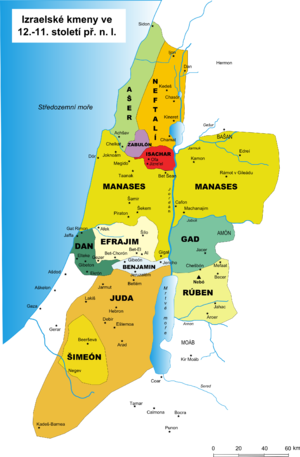 Image via Wikipedia
Image via WikipediaFrom the Books of Moses and Joshua, we read that whenever Israel trusted in God to do as He promised, i.e. to go before them in battle, they had a speedy, thorough victory over all who were hostile to God. Obviously, the land of Canaan was populated with a people who were descendants of Noah's son Ham, upon whom God placed a generational curse which reflected the spiritual nature of Ham and all of his descendants. (See Genesis 9 -10, for an account of how Ham dishonored his father in a way which reflected his profound disrespect for God. Canaanites, sons of Ham, were associated with the curse.) God did not want the Canaanites to live in the land that He predetermined should go to a people that He chose ( Deut. 7:7) to live there. So, fighting to dispossess the Canaanites was linked to aligning oneself with God's Will, God's Promise, God's Sovereignty, and with God's absolute Justice.
In Judges 1, when Israel called upon the Lord, God told them that Judah should go into battle first because God had already predetermined their victory in battle. In these battles, Simeon partnered with Judah. In Judges 1:19, there is a summary statement that Judah successfully took possession of the land because God was with them. But, after that, begins a litany of failure to secure the land. Benjamin failed; Manasseh failed; Ephraim failed; Zebulun failed; Asher failed; Naphthali failed; Dan failed. Even though not all of the tribes are specifically listed, there is a resounding sense of failure. Though Israel entered the land that God gave them, they were not living in the victory God promised them.
So, in Judges 2, the Angel of the Lord appeared to Israel in Bakim. The Angel reaffirmed that though the covenant with Israel would never be broken, God would no longer go before them in battle to dislodge the denizens of the Promised land. As a consequence of their sin, Israel would not only have to fight the Canaanites alone but also to continuously resist the spiritual corruption that Canaan represented. Nationally, resisting evil within your own borders is similar to sustaining a chronic inflammation in your body which drains you of the strength and well being that you need to live successfully.
And what was the sin of Israel? At this juncture, I believe that it was Israel's failure to go forth in the land with the strength of conviction that God, Sovereign King of the Universe, had Himself given them the land. If Israel acted in the strength of their faith in God, then no nation could stand against them because God Himself would stand along side them. Israel's only true strength was/is their covenant relationship
with God the Creator. The only thing really required of Israel was to rely on God to be who He said He was and to do what He said He would do.
So, after hearing the Angel's proclamation, the nation wept. These were not simply tears of unhappiness or discomfort - but soul rendering tears of mourning, bewailing the absence of the Presence of One who fought before them in battles of the past, of the One who assured them of victory in battle. Israel understood that without God going before them, they were to be left to their own devices which were only as good as a human being, a created being, could develop. And rightly so, that is a cause for lament.
Blue Letter Bible. "Dictionary and Word Search for bakah (Strong's 1058)". Blue Letter Bible. 1996-2010. 28 Oct 2010. < http:// www.blueletterbible.org/lang/lexicon/lexicon.cfm?
Strongs=H1058&t=KJV >

God alone initiates salvation. He always turns toward man first and seeks him, as when God walked in the Garden (Genesis 3:8). Man does not seek God or turn to him without God first calling man to Himself (John. 6:37, 44; 1 John. 4:10,19).
ReplyDeleteSecond, God’s initiative does not exclude man’s free response, but demands it (Catechism of the Catholic Church [Catechism], nos. 154, 155, 2002; Philippians 2:12, 13). In other words, God wills that man be free to choose His grace or reject it.
Third, salvation is extended to each and every human person, not limited to just some, and one can fall away from grace (Hebrews 2:1-4; 6:4; 2 Peter 1:10; 3:9; 1 John 5:16, 17).
Furthermore, it is imperative that once one is touched by grace, he perseveres in charity lest he forfeit the free gift of salvation (Lumen Gentium [LG], no. 14). Within the confines of these principles, Catholics have sought to understand the mystery of predestination.
Though opinions and formulations have varied among Catholic theologians, with these principles left intact, there is room for legitimate speculation.
The only proper framework to understand predestination must be rooted in the notion of a communion of persons in love. Why? The nature of God as Trinity is this very kind of communion and God created man to share in that “blessed life” (cf. Catechism, no. 1).